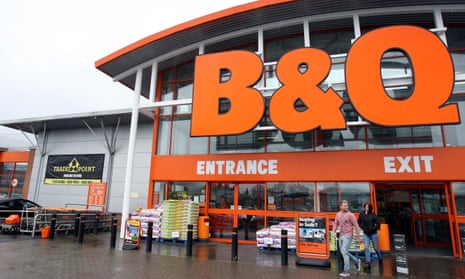Britons are putting off major home appliance and furniture purchases and DIY projects, in the latest sign that household budgets are under pressure in the run-up to Christmas.
On Tuesday, the DIY chain B&Q, the department store chain John Lewis and AO, the online electrical retailer, joined the list of companies warning of tough trading conditions, as the slowdown in the housing market has a knock-on effect on demand for everything from fitted kitchens and bathrooms to sofas and washing machines.
The AO World chief executive, Steve Caunce, said the retailer was experiencing “challenging” conditions in the UK as fewer house moves depressed demand for new appliances.
“We saw the market getting tough at the back end of 2016 and right now it is about the same,” Caunce said. “It does feel like the customer is very nervous … there’s Brexit, talk of inflation. Lots of things we can do very little about.”
AO shares closed down nearly 2% after its operating losses widened to £12m for the six months to 30 September, up from £2.8m a year ago. The fall deeper into the red was blamed on its sponsorship of ITV’s Britain’s Got Talent, which was behind a 50% increase in marketing costs to £17.4m for the half year.
Despite the tough environment, AO’s UK sales were up 7.4% to £316.8m as the company benefited from the trend towards shopping online.
The gloom knocked the shares of retailers with large household goods businesses including AO rival Dixons Carphone, discount chain B&M and Debenhams.
“The consumer is under pressure,” Kate Calvert, a retail analyst at Investec, said. “Real income is declining and, now inflation has come back, there is a shift in retail sales towards food.
“Non-food sales have dropped off as consumers only have a certain amount of money in their pocket and they have to eat.”
B&Q, which is owned by Kingfisher, said like-for-like sales were down by 1.9% in the three months to 31 October, with its kitchen and bathroom business suffering in the cooling housing market.
Sales of seasonal goods also dropped by 7.1% as a cool, wet August hit sales of outdoor paint, wood treatments and barbecues.
There was a better performance from Screwfix, B&Q’s sister chain, which is aimed at the trade. Its underlying sales increased by 10.2%, resulting in an overall 1.5% rise in UK like-for-like sales for the Kingfisher group. The company remains cautious on the economic backdrop in the UK but expects to meet profit targets.
The poor performance at B&Q came despite problems at its rival Homebase, at which there was a near-14% slump in sales in the three months to the end of September as Bunnings, its new Australian owner, tries to transform the chain. It blamed the disastrous sales performance on the large-scale clearance of discontinued stock.
John Lewis managed its first week of sales growth in two months as sales of clothing and technology were bolstered by the arrival of cold weather, the launch of the iPhone X and price matching with early Black Friday sales.
However, homeware sales last week were down by 1.4% as sales of expensive items such as fitted carpets and kitchens fell.
Last month Paula Nickolds, the managing director of John Lewis, said sales of expensive items for the home were “really challenged” as housing sales remained low.
A slump in spending on Christmas getaways, as well as cutbacks on clothing and household goods, are expected to result in a 0.1% dip in UK household spending over the festive period, according to research compiled by IHS Markit for Visa.
The research predicted that sales of household goods would fall by 1% in November and December, compared with the same period last year, while clothing and footwear sales would be down by 0.5%.
UK consumers’ spending power is being squeezed as inflation rises and wage growth falter. They are also coming to terms with higher borrowing costs after the Bank of England increased interest rates for the first time in more than a decade.
The tough high-street conditions mean retailers are fighting hard for business in this week’s Black Friday sales.
Caunce said it was not yet clear how many consumers were holding back their cash to make the most of the deals on tech goods, from TVs to headphones to coffee machines.
“I’d be astonished if Black Friday wasn’t the biggest trading day of the year. I think the UK consumer is understanding it more and more,” Caunce said.
“We are very happy with what has happened so far, but need to understand how that will impact the rest of the period, particularly Friday.”

Comments (…)
Sign in or create your Guardian account to join the discussion